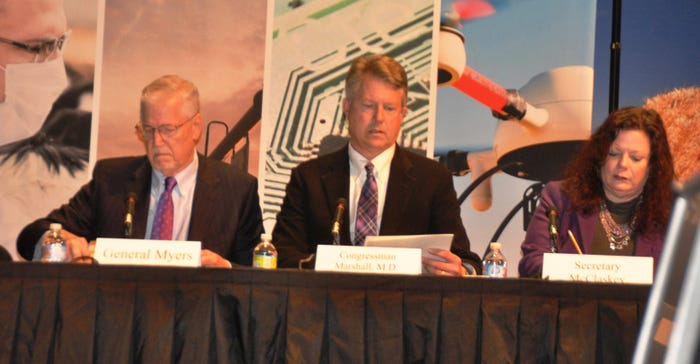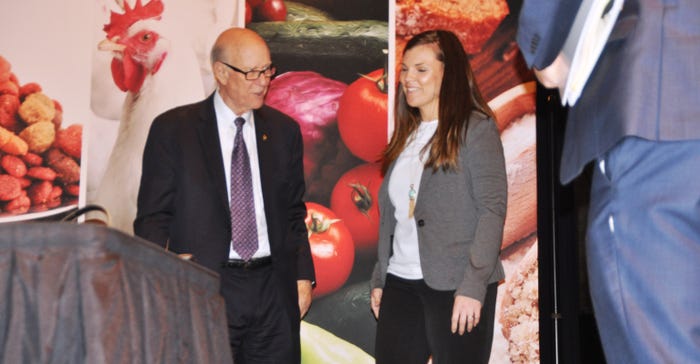
Two clear messages came from witnesses who testified during the first Senate Agricultural Committee field hearing on the 2018 Farm Bill: Agriculture needs exports, and agriculture needs affordable crop insurance.
Sen. Pat Roberts, chairman of the committee, and Sen. Debbie Stabenow, ranking member, conducted the hearing before a crowd that came close to filling the main floor of McCain Auditorium on the Kansas State University campus, a capacity of about 900 people.

WELCOMING REMARKS: Kansas leaders offering welcoming remarks ahead of the Senate Ag Committee’s first hearing on the 2018 Farm Bill were (from left) Gen. Richard Myers, president of Kansas State University; state Rep. Roger Marshall, 1st District; and Jackie McClaskey, Kansas secretary of agriculture.

In a press conference before the hearing opened, Roberts said that farmers are in a "rough patch" with the lowest prices in the last 16 years.
"Trade is on the mind of every farmer and rancher in America," he said. "With TPP in the past and NAFTA in question, the time is now to get ahead of the curve in negotiations. We need to start with the people who are already in place, move quickly to get the rest of the team in place, announce the countries we are working with and move ahead."
Strong bipartisanship
Both Roberts and Stabenow stressed the strong bipartisanship of the Senate ag committee and pledged to work for farmers, ranchers and towns across rural America, as they move ahead to discover what works well about the 2014 Farm Bill, which they jointly crafted, and what needs to be tweaked to work better for American agriculture.
Stabenow said that farming is the riskiest business in the world.
"No other business has its success or failure hanging on how much it rains, how hot it is or how cold it is," she said. "Farmers need tools to manage that risk, and they need tools to help them manage their land to conserve their resources. Every small town in Kansas, Michigan and America gets help through the Rural Economic Development program. We're here to ask farmers what is working and what's not. And if it is not, we will fix it."
Stabenow said she has been getting communication that indicates the 2018 Farm Bill needs to repair the Dairy Margin Protection Program and tweak the protections for cotton growers — and testimony during the hearing bore out those concerns.
Dairy, cotton need help
Lynda Foster, who operates a family farm and dairy operation near Fort Scott in southeast Kansas with her husband and son, said that the MPP-Dairy would likely have been a success had it been left untouched from the initial title in the 2014 Farm Bill.
"The problem was it was diluted by 10% as it went through the process," she said. "The feed formula calculations were changed. I don't think we need a new title. We just need the old one put back the way it was in the first place."
Foster said she would also like to see the kind of overlap in risk management programs through insurance and Title 1 that is available to row crop farmers extended to cover dairy farmers.
Moscow farmer Tom Lahey addressed the issue that cotton farmers face, even while acknowledging that southwest Kansas, while it has a cotton industry, can hardly be considered "cotton country."
However, he said, the problems for growers in Kansas and the Mississippi Delta are the same: widely declining prices and the need for export markets, along with not being eligible for Title 1 Farm Bill safety net programs, such as the Agriculture Risk Coverage (ARC) and Price Loss Coverage (PLC) programs.
He added, however, that cotton farmers do benefit from conservation programs, including the Environmental Quality Incentives Program (EQIP) and the Conservation Stewardship Program (CSP), and said most farmers would like to see those programs continued and fully funded.
Kent Moore, speaking for the Kansas Corn Growers Association, said the industry has proved it can produce sufficient volumes of grain to support food, fuel and feed, and still supply the world markets with corn, ethanol and distillers grains.
Moore stressed the importance of the Market Access Program and the Foreign Market Development Program to the corn and ethanol industries.

INFORMAL CHAT: Sen. Pat Roberts chats with witness Amy France of Marienthal after the first 2018 Farm Bill Field Hearing in Manhattan on Feb. 23.

The specter of disease
Pork producer Michael Springer from Independence in southeast Kansas talked about the importance of biosecurity and said pork producers would like to see a repository of vaccines against the most common forms of foot-and-mouth disease and the identification of laboratories that could rapidly produce millions of doses of vaccine quickly in the event of an outbreak.
He said the industry would need 10 million doses in the first two weeks of an outbreak and the capacity to produce 40 million doses in the next six weeks.
"An outbreak would cost the U.S. corn, soybean, beef and pork sectors about $200 billion," he said. "I would urge putting some kind of protection from those kinds of losses in the next farm bill."
Speaking for grain sorghum growers, Andale area farmer Kent Winter told the senators that sorghum is the premier water-saving grain crop that can be a solution to water shortages moving forward. But, he said, sorghum growers need assurance that funding for research to combat an enormous insect threat in the form of the sugarcane aphid needs to be in place to secure the future of the industry.
Support system
The second panel of witnesses was comprised of people representing the support system for farmers and rural communities, including bankers, Farm Credit System leaders, rural cooperatives, companies dealing with broadband expansion, renewable fuels, water management and rural economic development.
Speaking for the Farm Credit System, Gena Ott of Frontier Farm Credit said the upper 50% to 60% of farmers are holding their own, while the bottom 15% are feeling enormous stress.
Shan Hanes, president and CEO of 1st National Bank in Elkhart in far western Kansas, said crop insurance is vital to helping farmers secure financing to stay in business and that an increase in the cap on guaranteed loans would help farmers who are facing hard times.
Catherine Moyer with Pioneer Communications in Ulysses, said that the challenge for her industry in attempting to provide broadband connections that might eventually help repopulate rural communities is the lack of density in potential customers. "In many areas, I am looking at two customers per square mile," she told the committee. "It's hard to get the money to build a network and harder still to pay back any loans when you just don't have the density to support it."
At the same time, the people who do live in those sparsely populated areas benefit from the expansion of broadband networks, and that infrastructure provides the underpinning that can eventually mean an increase in population in those regions.
Support renewable fuels
Derek Peine with Renew Kansas spoke out in favor of the Renewable Fuel Standard and Kansas' 12 ethanol plants, saying the domestic industry continues to do what it was created to do: provide a domestic market for a huge oversupply of U.S. corn and sorghum.
Speaking for rural communities, Cherise Tieben, Dodge City manager, said that the population increases to define a "rural" community enabled Dodge City to use USDA Rural Development funds to build affordable housing in the community, and attract and keep more new residents in the city.
Stabenow, in follow-up questioning, stressed her support for an expansion of a biobased economy that would include the development of more consumer products with a biological base.
She mentioned in particular the soy-based foam in Ford Motor Co. vehicle seats — a product developed at Pittsburg State University.
About the Author(s)
You May Also Like




